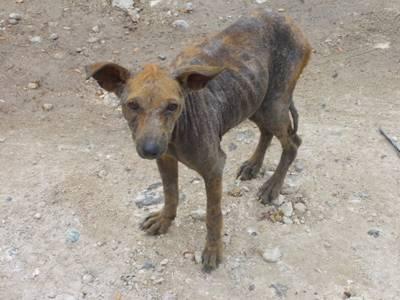‘Pek’ Is Mayan for ‘Dog’
The following is a guest post by Heather Carlson, PETA’s manager of Communications.
This year for spring break, I was looking forward to spending a week in Mexico with my family. We planned to relax, scuba dive for the first time, and enjoy each other’s company. But when we looked out our bus windows while traveling in the rural Yucatán Peninsula, we saw chickens and pigs in small crates, underweight cows tied to trees, and stray dog after stray dog.
As we arrived in a small Mayan village, I glimpsed a small, seemingly hairless figure out of the corner of my eye. I thought to myself, “That could not possibly have been a dog.” The tour bus pulled into the parking lot of a flea market, and as the other tourists filed in to the store, my family and I ran back up the street to the tiny convenience store where I thought I had spotted the dog. Sure enough, there she was: small, nearly hairless, and riddled with mange. Although we approached slowly so that we wouldn’t spook her, she cowered and ran away. We were close enough to see that she was dreadfully thin and that her body was riddled with open abscesses—her skin cracked from the progression of the disease that was eating her alive.
 |
The people working at the little store didn’t understand our questions about the dog, so we ran back to the tourist market and asked if there was an animal shelter or a vet in the area who could help us with a dog suffering from mange. They did not fully understand us, but they nodded and said “sarna” (which I later learned means “mange”) and indicated that there was no animal hospital anywhere in the area. With the tour bus leaving; no car, taxi, or bus services nearby; and barely anyone who spoke English there to help us, my family and I left some food near where we’d seen the dog and reluctantly left her there in Ebtún.
From that moment forward, I made it my mission to find her help. I called home, and PETA’s Casework Division worked hard to put me in touch with activists in the area who might be able to help get medical treatment for the dog, whom we had started to call “Maya.” One of PETA’s caseworkers helped me find someone willing to drive me back to Ebtún, and we spent a day walking around the village looking for her. The villagers indicated that Maya frequented the spot in front of the store but that they hadn’t seen her since early that morning. I had to fly back home the next morning and, upon nightfall, we had to leave Ebtún—without little Maya.
When I got back home, I continued looking for someone who could make the journey back to Ebtún to try again to find the dog. After e-mailing, networking via Facebook, and getting in touch with animal lovers in the area, I learned more about the plight of animals in the Yucatán Peninsula. Activists there have quite a challenge in front of them—in a country that openly advertises cockfights on city streets, little is known about spaying and neutering, and there are few protections for animals.
Even though significant time had passed and the odds were clearly stacked against her, I recently received some amazing news—Maya had been rescued. Sophie Van Den Abeele and Emma Guerrero of Cancun Animal Rescue made the three- to four-hour journey from Cancun to Ebtún and spent the day trying to find the little street dog with “sarna”—who, as it turns out, the local villagers had named Muñeca. They found Muñeca just as scared, still suffering from mange, and seemingly pregnant. While they were loading her into the van, another dog approached, and they quickly discerned that she was suffering from a tumor in her vulva. The locals reported that she was also a stray, and so Abeele and Guerrero were able to bring her back with them as well. They arrived back home late at night, and a local vet they often work with tended to the dogs’ immediate needs—including removing the second dog’s tumor. Both dogs were spayed and have started on the road to rehabilitation.
Please never leave a suffering animal behind if you find one while on vacation. I’m not the only person whose life was touched by what we learned in Mexico—in part because of the suffering of the animals they witnessed from the bus windows on the way to Chichén Itzá, two more members of my family went vegetarian. As a result of our spring break vacation to Mexico this year, I have reserved a special place in my heart for the animals there and for compassionate people like Sophie and Emma who have dedicated their lives to helping them.
Donations to help fund Sophie and Emma’s work can be made to the PayPal account of Cancun Animal Rescue Change My World A.C.

